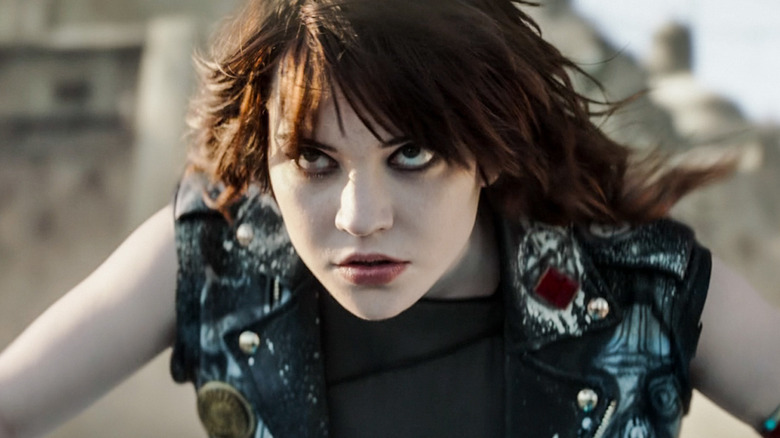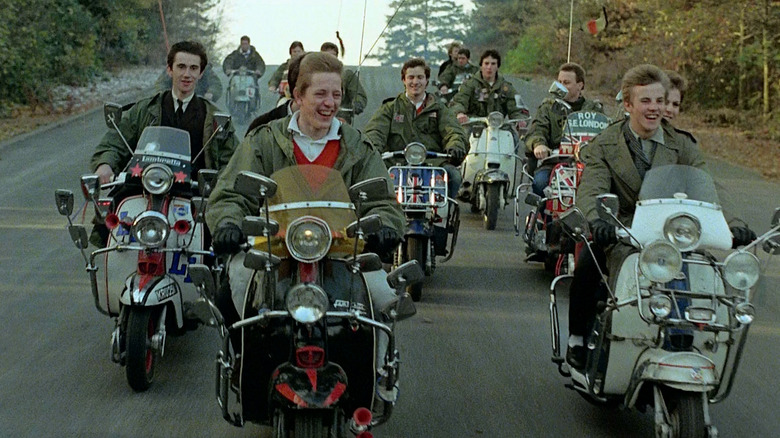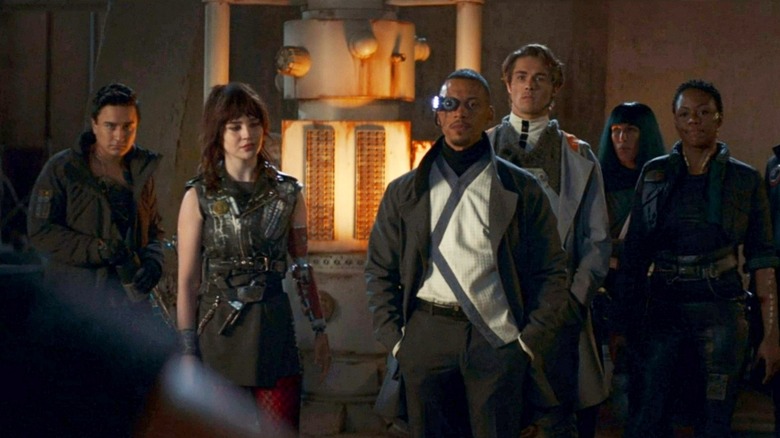The Real-Life Inspiration For The Book Of Boba Fett's Wacky Biker Gang
If there's one maxim that holds true for "Star Wars," even all these decades after George Lucas first brought his fever dream of a space opera to audiences worldwide and altered pop culture forever, it's this: no matter how big a "Star Wars" fan you may be, you just never know what you're going to see every time a filmmaker puts their own spin on the material.
In the years since Disney acquired Lucasfilm and jump-started this new era for the franchise, we've encountered an all-out cornucopia of new and never-before-seen additions to lore, unexpected reinterpretations of iconography, and a certain tendency among creatives to dig deep into the annals of history — film history or otherwise — for inspiration to tell new stories in this galaxy far, far away. Think of Rian Johnson meticulously recreating specific shot selections from classic cinema in "Star Wars: The Last Jedi," or "Rogue One: A Star Wars Story" borrowing elements from "Seven Samurai" – or, in a delightfully horror-tinged moment of inspiration, a certain spider-filled episode of "The Mandalorian" going full "Alien" on us.
"The Book of Boba Fett" is only the latest "Star Wars" production to put its wide-ranging influences on display ... but in this case, many viewers didn't seem to be picking up what director Robert Rodriguez and creator Jon Favreau were putting down. The introduction of the brightly-colored yet surly gang of cyborg street bikers led by Sophie Thatcher's Drash in the third episode, "The Streets of Mos Espa," didn't result in the unanimous praise that the creative team likely anticipated. According to a relatively small but vocal segment of the fanbase, these new characters and their trusty bikes had no business even appearing in "Star Wars" in the first place.
But as with many other elements of "Star Wars," this creative decision didn't come out of nowhere. In fact, the gang and their distinctive rides are rooted in a real-world subculture that does much to explain their appearance, behavior, and presence in the series — as it turns out, "The Book of Boba Fett" brought the Mod movement to "Star Wars." What exactly are Mods and how do they factor into the adventures of a bounty hunter/crime lord? We're glad you asked!
Kids These Days...
Let's take a trip back to the volatile, free-swinging, counter-culture years of the 1960s.
Leave it to the Brits to make a movie loosely based on an album by legendary British rock band The Who, am I right? 1979's "Quadrophenia" likely won't be at the forefront of anyone's mind when watching a Boba Fett spin-off series, but this film set in 1964 London (currently streaming on both HBO Max and the Criterion Channel) acts as a solid beginner's guide to the complexities of Mod subculture. In short, they began as a small group of young men branded as "modernists" for their particular taste in jazz and rock music, neatly tailored fashion, and — most importantly — a singular obsession with scooters. Amusingly enough, the 2021 Pixar film "Luca" captured a snippet of this idiosyncrasy, symbolizing the title character's quest for freedom with that rundown little Vespa scooter (a model that Mods especially favored).
This movement could easily be dismissed as little more than another branch of hippies, and there certainly is some general overlap between the two groups, but Mods forged their own identity altogether in the streets of '50s and '60s London, not too far removed from the people and places captured in Edgar Wright's "Last Night in Soho." Raised in extravagant prosperity in post-War Britain, this sprawling generation of teens channeled their need to express themselves, their disposable income, and quite a bit of boredom into a lifestyle that prioritized style, fashion, and rebelling against authority. As put forth in vivid detail by the "The Mods: Shaping a Generation" project:
The Mods were an incredible 1960's youth sub-culture who shared a common desire to embrace a new found financial and parental freedom and to stand out above the crowd with regards to originality in fashion, music and social status and what they achieved still influences aspects of contemporary life.
The main elements of Mod life — fashion, music, drugs, transport, sociability, originality — provided a way out from the mundane lifestyle that their parents and older siblings had experienced. National service was out, escapism and independence, both financial and creative, were in."
Bikers and Boba Fett
Thus far, "The Book of Boba Fett" has already showed some inspired creative inspiration by pulling directly from Temuera Morrison's Māori heritage, incorporating Fijian weapons design in to the Tusken Raider gaffi sticks, and picking up where "The Mandalorian" left off by adding even more surprising layers to Sand People culture. Given the broad range of influences that make up "Star Wars" in general — spanning Akira Kurosawa films, classic Westerns, old "Flash Gordon" serials, and even George Lucas' own "American Graffiti" – it's not much of a stretch to accept that Mod culture could somehow find its way into the bounty hunter's spin-off series.
The predominant complaint leveled at Drash and her gang appears to be the fact that they simply don't "fit in" well amid the otherwise subdued aesthetics of Tatooine ... but that's entirely the point. Personality-wise, the street toughs speak to authority figure Boba Fett with withering disdain, dismissing him as an "old man" and admitting that, yes, they stole water from the local price-gouging water-monger (played by Stephen Root). Beneath their hardened and flashy exteriors, their cause is a righteous one.
This extends to their choice in vehicle, as well, offsetting the barren sands of the desert planet with an assortment of rainbow colors that wouldn't feel one inch out of place in a '60s/'70s period piece set on Earth — even down to the downright modern-looking handles on their rides. If you're tempted to complain about "anachronisms," however, maybe first take a brief tour through Lucas' prequel trilogy and remind yourself that Obi-Wan once frequented a diner ripped straight out of 1950s America.
It's still too early to tell how their ultimate role in "The Book of Boba Fett" will shake out, but don't be surprised if the series incorporates some elements of the turf wars that plagued the bikers' real-world counterparts — likely through the Pyke Syndicate, who just arrived in the present-day storyline at the end of the last episode, prepared for "war." Similar to Drash's bikers, the Mods' progressive ideals and aspirations didn't always make news for the best reasons. The turf war clashes between Mods and their polar opposite Rockers are the stuff of legend, adding key context to their influence on the series.
By riffing on Mod subculture, "The Book of Boba Fett" hides one of its most fascinating influences in plain sight.


